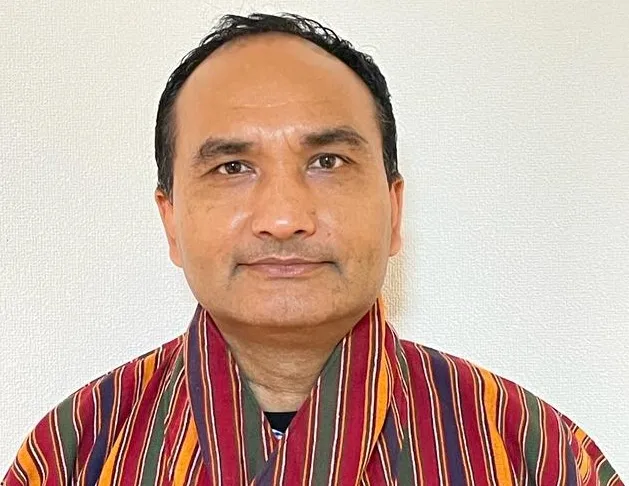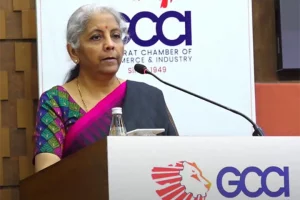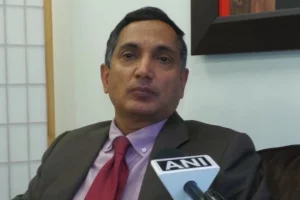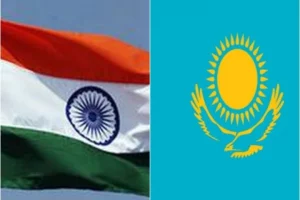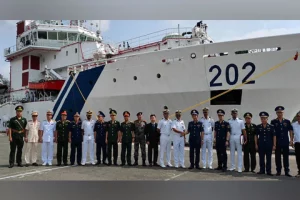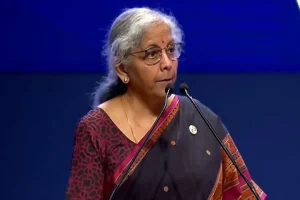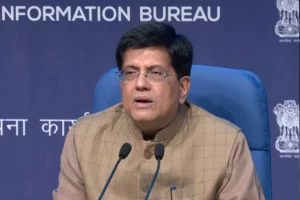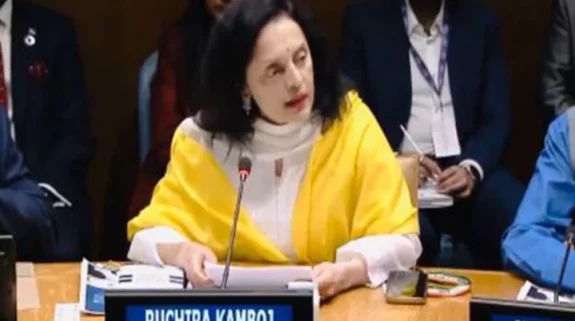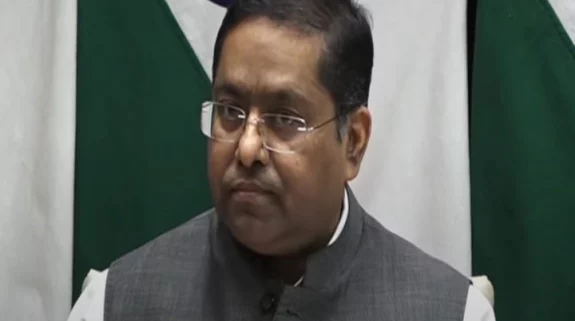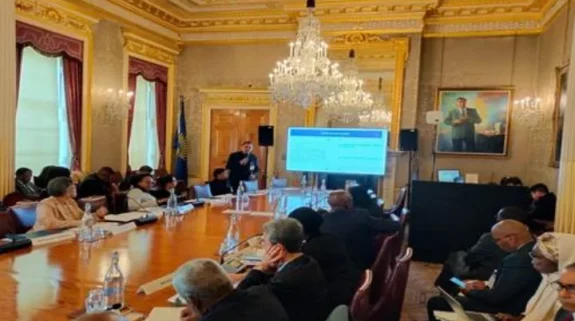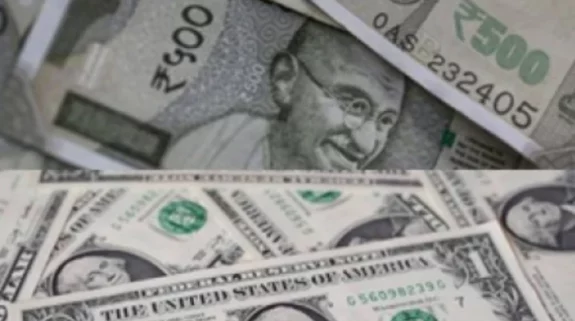As the global economy shrinks and countries chase the International Monetary Fund (IMF) and the World Bank (WB) for bailouts, India stands strong as a rock for the South Asian region.
The country has been able to withstand the after effects of the Covid-19 pandemic and has helped in averting a humanitarian crisis in the region with its generous aid of food and essential items to neighbouring countries.
In an exclusive interview to India Narrative, Dr Dil Bahadur Rahut, Vice-Chair of Research at the Asian Development Bank Institute (ADBI) says that India will not only come out stronger from the crisis but will be able to support South Asian nations in their hour of crisis. He says that India should also foster regional trade and economic integration and contribute to the inter-regional cooperation.
Dr Rahut has earlier worked with the International Maize and Wheat Improvement Centre, the Royal Monetary Authority of Bhutan’s Research and Statistics Department, and the Indian Council for Research on International Economic Relations (ICRIER).
Excerpts from the interview:
IN: Do you think we are headed towards a bigger humanitarian crisis – food shortages, rising energy prices and disrupted global supply chains as the Russia-Ukraine war drags on and tensions mount in East Asia?
DBR: I believe that many nations are committed to peace, stability, and ensuring global food supply; therefore, I don’t think there will be a humanitarian crisis. I think we have learned this and proven it from the Covid pandemic. There are challenges against the planet and humanity. But I believe that there are vast sections of the society who are committed to make the world a better place live
There are countries like India, which supplied wheat to countries that were heavily dependent on Russia and Ukraine for its supply. Several people and countries are working towards peace and stability and development.
As long as the Russia-Ukraine war continues, I think low-income countries and the most vulnerable sections of society will be affected. It will compound the impact of COVID, which has already created havoc in terms of employment, income, and food security, and prices.
Russia and Ukraine were producing almost 30 per cent of the global wheat, and were major exporters of sunflower-oil, corn and barley. Reduction in the supplies of wheat, sunflower oil, corm would mean a price rise, which is reflected in the global food inflation. In March 2022, the FAO food price index touched 159.7, and it gradually came down to 138 in August 2022 from the earlier 128 in August 2021.
The second thing was the restriction in the supply of fertilisers from Russia and Ukraine, which affected the production of agricultural commodities in many countries. As a result, food prices have increased. Further some of the countries have banned food exports. Finally, the energy shock has also contributed to the increase in the food price.
Russia is an important supplier of energy, and when the energy supply from Russia it affected the European Union (EU), especially Germany. The EU had not prepared for uncertainties, had the EU built its own infrastructure and diversified sources of energy the situation would not have been as bad.
Risk analyst Supriya Ravishankar from #Sibylline tells @india_narrative that #India will see growth despite global challenges & #inflation. The world seems to be headed towards imminent strife over #fuel and #food prices. @iProbal @Aditijan @dhananjayjnu https://t.co/pO4n37qqi2
— Rahul Kumar (@rahulkumarindia) July 5, 2022
IN: All of South Asia faces critical conditions. The IMF has rolled out more loans for Pakistan and Sri Lanka but these may turn out to be inadequate in the long run. Even Bangladesh and Nepal are facing financial challenges. What is your assessment of the situation in South Asia?
DBR: Sri Lanka faces a crisis because of the flaws in their agricultural and tax reduction policies. Their commodities couldn’t keep up in the international market. Also, they were heavily dependent on tourism and remittance as an important source of revenue, which put Sri Lanka in a tough situation during COVID. Right policies built on the foundation of good governance could have helped them to avert the current crisis.
Pakistan is going through a difficult time and the recent flood made it even more severe. The trigger was, of course, Covid and the supply chain disruption due to the Russia-Ukraine war. For the stability and prosperity of any country, good economic policy built on the foundation of good governance is a prerequisite.
Nepal’s important source of revenue is tourism, which has dropped down due to the Covid pandemic. Further remittances, which is also another important source of revenue for Nepal, has been affected due to Covid. Like other countries in south Asia, Bangladesh has also been affected to some extent but is taking initiatives to stand strong.
Because of the Russian crisis, the demand for commodities contracted. India has always stood strong partly because of its good economic, and fiscal policy. However, strong internal demand in India is one of the reasons for economic stability.
Coming out from the crisis won’t be easy for South Asia, but through regional cooperation and support from international communities, regions will overcome it and make significant progress. India is a hope for regional growth and transformation as it is a big country both in terms of population, economy and resources. India has played an important role in the food security of the region and should continue to support regional cooperation and trade.
Bhutanese economy is also strongly aligned with India. Bhutan’s significant trade is with India and so is the case with Nepal. We have to increase inter-regional trade—including with Bangladesh. It is the Indian economy that is the big hope for the South Asia region.
When we talk about South Asia as a region, we have to think bigger in what we think of as a region. We have to integrate ourselves like the Association of South-East Asian Nations (ASEAN). We need to connect with South-East Asia through high-speed railways, trade and people.
IN: So, why should South Asia link up to ASEAN?
DBR: We should first connect South Asia and then link up to South-East Asia for the energy security of the region—for renewable energy and transformation. Then we should focus on food security and then on Net Zero carbon emissions.
We have to integrate strongly with ASEAN to expand opportunities for both the region and the prosperity of south and south east Asia. I believe South Asia and ASEAN are one big piece of land with historical connection and share similar visions. I find the region largely stable and we can depend upon each other.
If there is one article that you have to #read today, this is that #article @CJBdingo25 speaks eloquently about the #dystopia we live in. #UkraineWar #COVID19 #economy #China #Taliban #Terrorists #TaiwanStrait https://t.co/4nte9QGu6M@FISI_UK @atulaneja @TibetPeople @TarekFatah
— Rahul Kumar (@rahulkumarindia) May 31, 2022
IN: Many people have predicted that with most South Asian nations facing financial crisis, India too will go down the same path. How is India, according to you, faring on the economic front?
DBR: India will do very well. India is a large country. It is making huge investments on infrastructure—hard infrastructure like roads and railways as well as social infrastructure.
India is becoming more integrated. The north-east is coming closer to Delhi. There is a feeling of oneness and positive things are happening.
India is also investing in clean energy transformation, water security and in soil health. It is also working on livelihood programmes to improve the life of people in the rural areas. Though India has done a lot, I wish it does more.
The US, EU and China are the leading in research and development as they invest a lot more into research. India should also do that—invest in people to bring them into research. Indian academic institutions are good, but India can do more to bring them at an international level. Academic institutions will bring about transformation. Like the US, EU and China, India should change itself and attract regional and international researchers.
In terms of agriculture, India is strong and can provide leadership in the region and to the world. India should also genuinely cooperate with regional and international researchers in agricultural research.
The world looks up to India for many reasons. India has resilience to all kinds of crises. It always manages to overcome, for example—the Covid waves, vaccine development, food and pharma industries. India is not only a big market, but a place where productions can happen. Given its heritage, India is also a great destination for tourism.
IN: How do you see India’s role in South Asia? It has been supporting Afghanistan, Sri Lanka and Maldives in various ways. It is also helping Bangladesh, Nepal and Bhutan. Do you view India as a stabilising agent because often there are people who are critical of India?
DBR: People have various opinions but that should not overshadow the proximity we have. India is able to offer so many things to the region and we should value those. Criticism should not deter India from providing humanitarian and developmental assistance and educational opportunities to other countries. Rather India should be able to build institutions like Nalanda, Mithila University, Valabhi University, Takshashila and attract regional and global faculty and scholars.
There is scope for more cooperation as countries in South Asia can have joint ventures with each other. India, Nepal and Bhutan have so much potential in hydro-power, high value agriculture and medicinal plants. Other countries in the region have their own comparative advantage, which we should harness.
We should be looking at setting up an economic zone together and growing together in South Asia.
IN: Supply chains have been damaged considerably due to the Covid-19 spread, the tensions in East Asia and also because of the Russia-Ukraine war. Do you think India and other countries in the region can restore supply chains?
DBR: From recent experience, we have noted uncertainties in the global supply chains and the need to ensure stability in the supply chain is crucial. One way to ensure a smooth supply chain is through partnership with stable partners and diversity of the sources of supply. Countries are beginning to diversify the sourcing of food, fuel and energy. This will open up opportunities for more regions in the world.
However, there will be bigger disruptions in supply chains because of climate change, particularly in the food supply chain. Countries will have to invest in reducing greenhouse gas emissions (GHG). We can see what happened during the heatwaves in India, Pakistan and Europe. Asia plans an important role in food security because of the green revolution but the climate change crisis can damage crop production and impact food and nutritional security.
Countries like India, Bangladesh, Indonesia, Thailand, Malaysia and Vietnam are doing very well in terms of restoring supply chains. I believe these emerging countries should play a bigger global role in strengthening the value chain.
Also Read: India at 75: Modi’s outreach to the Gulf dwarfs previous initiatives






